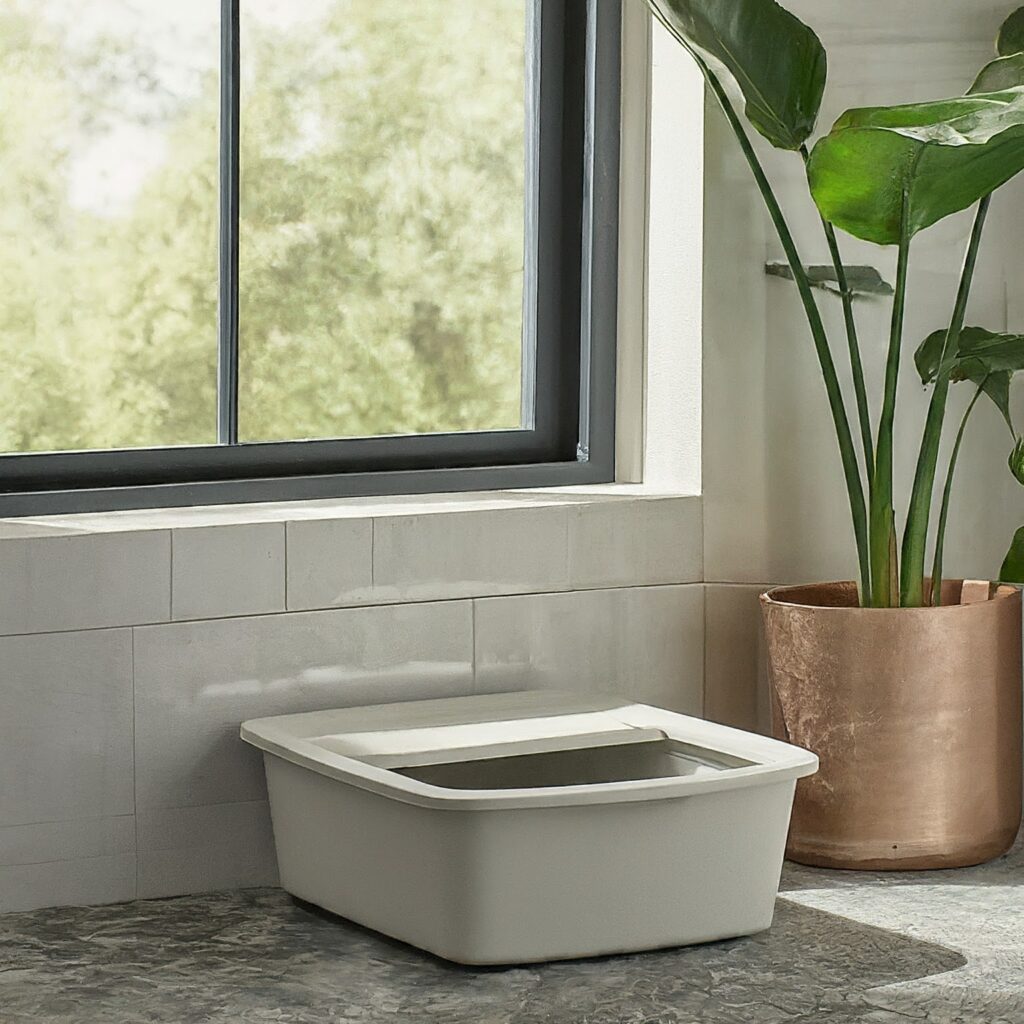Cat peeing outside the litter box can frustrate any pet owner. But what if worms are the reason?
This behavior, though unusual, might be linked to underlying health problems caused by parasitic infections.
In this blog, we’ll uncover the surprising connection between worms and litter box issues, offering new insights and actionable tips to help your feline friend.

Table of Contents
Why Do Cats Pee Outside the Litter Box?
Cats are naturally clean animals. When they avoid their litter box, it’s often a sign of discomfort or illness.
Common reasons include:
- Urinary tract infections (UTIs).
- Stress or anxiety.
- Dirty or inaccessible litter boxes.
- Medical conditions like kidney disease or diabetes.
But worms? That’s a less obvious cause.
Cat Pee Turns Litter into Mud | Reasons & Solutions
How Worms Affect Cat Behavior
Parasitic worms like roundworms, hookworms, and tapeworms can cause discomfort and behavioral changes in cats.
Here’s how worms might lead to litter box avoidance:

- Bladder Irritation
Some worms migrate through a cat’s body. If they invade the urinary tract or cause inflammation near the bladder, it may lead to frequent urination or accidents. - Abdominal Pain
Worm infestations often cause bloating and abdominal pain. A cat experiencing discomfort may associate the litter box with pain, leading them to avoid it. - Weakened Immunity
Worms drain nutrients, weakening a cat’s immune system. This can make them prone to secondary infections like cystitis, which impacts urination habits. - Behavioral Stress
Chronic worm infestations stress cats. Stress, in turn, can trigger litter box avoidance.
Cassava Cat Litter: A Sustainable Choice for Your Cat
Signs Your Cat Might Have Worms
Spotting a worm infestation early can prevent more significant problems.
Look for these signs:
- Visible worms in feces or vomit.
- Weight loss despite a healthy appetite.
- Bloated abdomen.
- Diarrhea or constipation.
- Vomiting.
- Lethargy or reduced activity.
- Dull coat or excessive shedding.
If these symptoms accompany litter box issues, worms might be the culprit.
Worms and Inflammatory Responses
Recent studies suggest that worms can trigger systemic inflammation. This can indirectly affect bladder function, causing overactivity or sensitivity.
For instance:
- Cytokine release: Parasites may induce inflammatory cytokines, affecting bladder control.
- Allergic responses: Worm-induced allergies may irritate, prompting unusual urination behavior.
This connection hasn’t been widely explored but offers a fresh perspective on parasitic impacts on urinary health.
Can Bed Bugs Live in Cat Litter? Exploring the Risks for Pet Owners
How to Confirm Worms Are the Cause
To diagnose worm-related issues:
- Visit a vet. They’ll perform fecal exams to detect parasites.
- Rule out other conditions. Tests can exclude UTIs, kidney disease, or stress-related issues.
- Observe behavior closely. Keep track of your cat’s symptoms and urination patterns.
Maggots in Cat Litter Boxes: Causes, Prevention, and Solutions
Treatment Options for Worm-Infested Cats
Effective treatment can restore your cat’s litter box habits.
1. Deworming Medication
Prescription dewormers eliminate parasitic worms. Common options include:
- Pyrantel pamoate.
- Fenbendazole.
- Praziquantel.
2. Nutritional Support
Boosting your cat’s diet can strengthen their immune system. Consider foods rich in:
- Omega-3 fatty acids (reduce inflammation).
- High-quality protein (promotes healing).
Ran Out of Cat Litter? Here’s What You Can Use Instead
3. Anti-Inflammatory Therapy
For severe cases, vets may recommend anti-inflammatory medications to ease bladder irritation.
Preventing Worm Infestations
Prevention is always better than cure.
Here’s how to keep worms at bay:
- Regular deworming: Follow your vet’s advice for routine treatments.
- Hygiene: Clean the litter box daily and wash your hands after handling it.
- Flea control: Many worms, like tapeworms, are transmitted by fleas. Use flea-prevention products.
- Outdoor supervision: Limit your cat’s exposure to infected soil or prey.
Environmental Adjustments to Reduce Litter Box Avoidance
Even after treating worms, behavioral changes might persist.
Here’s how to encourage litter box use:
1. Keep the Box Clean
Cats are picky about cleanliness. Scoop waste daily and change litter weekly.
2. Choose the Right Litter
Some cats prefer unscented, soft-textured litter. Experiment to find what works best.
3. Provide Multiple Boxes
If you have multiple cats, offer at least one box per cat, plus an extra.
4. Reduce Stress
Create a calm environment by:
- Offering hiding spots.
- Using pheromone diffusers.
- Sticking to a consistent routine.
When to Seek Veterinary Help
Not all litter box issues are worm-related. Seek professional advice if your cat:
- Shows no improvement after treatment.
- Displays signs of pain or distress.
- Stops eating or drinking.
Natural Remedies for Worms
Many pet owners now explore natural deworming options.
Here are a few gaining popularity:
- Pumpkin Seeds
Rich in cucurbitacin, pumpkin seeds can paralyze worms, making them easier to expel. - Diatomaceous Earth
This natural powder can help kill worms when added to food in small doses. - Probiotics
Improving gut health may prevent future infestations.
Note: Always consult a vet before trying natural remedies.
Conclusion: Act Fast to Help Your Cat
Worm infestations can lead to unexpected behavioral changes, including litter box avoidance.
By understanding this connection and taking swift action, you can restore your cat’s health and comfort.
Remember: Regular vet visits, proper hygiene, and preventive care go a long way.
If you suspect worms are causing litter box issues, don’t wait. Your furry friend deserves the best care possible.
FAQs: Can Worms Cause Cats to Pee Outside the Litter Box?
Q1. Can worms cause my cat to pee outside the litter box?
Yes, worms can indirectly cause litter box avoidance. Parasites can lead to bladder irritation, abdominal discomfort, or stress, which may alter your cat’s urination habits.
Q2. How do I know if worms are causing my cat’s litter box issues?
Look for symptoms like visible worms in feces, vomiting, bloating, weight loss, and diarrhea. If these symptoms accompany litter box problems, consult a veterinarian for confirmation.
Q3. What types of worms can affect my cat’s urination?
Roundworms, hookworms, and tapeworms are the most common culprits. These parasites can cause inflammation, discomfort, and secondary issues that affect bladder health.
Q4. How are worms diagnosed in cats?
A vet will perform a fecal examination to detect worm eggs or larvae. They may also recommend additional tests to rule out other medical conditions.
Q5. What treatments are available for worms in cats?
Deworming medications like pyrantel pamoate, fenbendazole, and praziquantel are commonly used. Your vet may also recommend nutritional support or anti-inflammatory therapy.
Q6. Can I use natural remedies to treat worms in my cat?
Some natural options, like pumpkin seeds or diatomaceous earth, are popular. However, always consult your vet before using them to ensure safety and effectiveness.
Q7. How can I prevent worm infestations in my cat?
- Schedule regular deworming treatments.
- Keep the litter box clean.
- Use flea-prevention products.
- Supervise outdoor activities to reduce exposure to infected prey or soil.
Q8. Are there long-term effects of worms on my cat’s health?
If untreated, worms can lead to malnutrition, weakened immunity, and secondary infections. In severe cases, they may cause organ damage.
Q9. Can cat litter worms spread to humans?
Yes, some cat worms, like roundworms, can infect humans. Practice good hygiene, clean the litter box regularly, and wash your hands after handling your cat.
Q10. What should I do if my cat continues peeing outside the litter box after treatment?
If the behavior persists, consult your vet to rule out other health issues or stress factors. Consider environmental adjustments, like providing a clean and accessible litter box and reducing stress at home.
Q11. How often should I deworm my cat to prevent infestations?
Indoor cats typically need deworming every 6-12 months, while outdoor cats may require more frequent treatments. Follow your vet’s recommendations.

